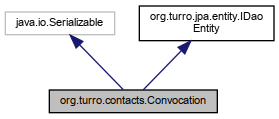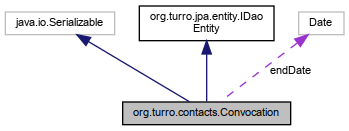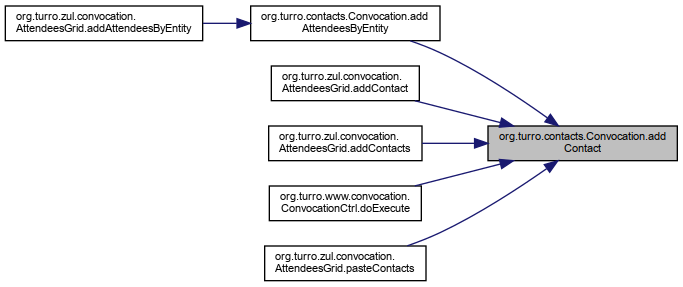- Author
- Lluis Turró Cutiller lluis.nosp@m.@tur.nosp@m.ro.or.nosp@m.g
Definition at line 65 of file Convocation.java.
◆ addAttendeesByEntity()
| void org.turro.contacts.Convocation.addAttendeesByEntity |
( |
boolean |
deep | ) |
|
Definition at line 262 of file Convocation.java.
263 AssistantSet as =
new AssistantSet();
264 Assistants.addAssistants(entityPath, deep, as, deep ? AssistantConstants.all() :
null);
265 for(Assistant a : as) {
◆ addContact()
| void org.turro.contacts.Convocation.addContact |
( |
Contact |
contact | ) |
|
Definition at line 270 of file Convocation.java.
271 if(contact !=
null) {
273 if(a.exists(contact))
return;
275 Attendee a =
new Attendee();
276 a.setContact(contact);
277 a.setConvocation(
this);
◆ attended() [1/2]
| void org.turro.contacts.Convocation.attended |
( |
| ) |
|
◆ attended() [2/2]
| void org.turro.contacts.Convocation.attended |
( |
IContact |
contact | ) |
|
Definition at line 286 of file Convocation.java.
287 WhereClause wc =
new WhereClause();
288 wc.addClause(
"update from Attendee a");
289 wc.addClause(
"set a.attended = TRUE");
290 wc.addClause(
"where a.convocation.id = :id");
291 wc.addNamedValue(
"id",
id);
292 wc.addClause(
"and a.contact.id = :cid");
293 wc.addNamedValue(
"cid", contact.getId());
294 new ContactsPU().executeUpdate(wc);
◆ entityId()
| Object org.turro.contacts.Convocation.entityId |
( |
| ) |
|
◆ getAttendees()
| Set<Attendee> org.turro.contacts.Convocation.getAttendees |
( |
| ) |
|
◆ getCallDate()
| Date org.turro.contacts.Convocation.getCallDate |
( |
| ) |
|
◆ getDaysLeft()
| long org.turro.contacts.Convocation.getDaysLeft |
( |
| ) |
|
Definition at line 312 of file Convocation.java.
313 return TimeUnit.DAYS.convert(callDate.getTime() -
new Date().getTime(), TimeUnit.MILLISECONDS);
◆ getEndDate()
| Date org.turro.contacts.Convocation.getEndDate |
( |
| ) |
|
◆ getEntity()
Definition at line 258 of file Convocation.java.
259 return Entities.getController(entityPath);
◆ getEntityPath()
| String org.turro.contacts.Convocation.getEntityPath |
( |
| ) |
|
◆ getEventDate()
| String org.turro.contacts.Convocation.getEventDate |
( |
| ) |
|
Definition at line 228 of file Convocation.java.
229 if(callDate !=
null && endDate !=
null) {
230 return EventDates.eventFormat(callDate, endDate);
231 }
else if(callDate !=
null) {
232 return I_.get(
"Starts") +
" " + EventDates.eventFormat(callDate);
233 }
else if(endDate !=
null) {
234 return I_.get(
"Ends") +
" " + EventDates.eventFormat(endDate);
◆ getIcalIdentifier()
| String org.turro.contacts.Convocation.getIcalIdentifier |
( |
| ) |
|
◆ getId()
| String org.turro.contacts.Convocation.getId |
( |
| ) |
|
◆ getLocation()
| String org.turro.contacts.Convocation.getLocation |
( |
| ) |
|
◆ getName()
| String org.turro.contacts.Convocation.getName |
( |
| ) |
|
◆ getOnlineUrl()
| String org.turro.contacts.Convocation.getOnlineUrl |
( |
| ) |
|
◆ getOrganizer()
| Contact org.turro.contacts.Convocation.getOrganizer |
( |
| ) |
|
◆ getPlainText()
| String org.turro.contacts.Convocation.getPlainText |
( |
| ) |
|
◆ getSerializerMappings()
| MappingSet org.turro.contacts.Convocation.getSerializerMappings |
( |
| ) |
|
Definition at line 349 of file Convocation.java.
350 MappingSet
set =
new MappingSet();
351 set.addMapping(Convocation.class, 1,
352 new String[] {
"id",
"entityPath",
"name",
"onLine",
"publishable",
353 "callDate",
"endDate",
"organizer" },
354 new String[] {
"text",
"location",
"onLineUrl",
"icalIdentifier",
"attendees" });
355 set.addMapping(Attendee.class, 2,
356 new String[] {
"id" },
357 new String[] {
"contact" });
358 set.addMapping(Contact.class, 3,
359 new String[] {
"id" },
◆ getServers()
| WsServers org.turro.contacts.Convocation.getServers |
( |
| ) |
|
◆ getSortedAttendees()
| TreeSet<Attendee> org.turro.contacts.Convocation.getSortedAttendees |
( |
| ) |
|
Definition at line 341 of file Convocation.java.
342 TreeSet<Attendee>
set =
new TreeSet(
new AttendeeComparator());
343 set.addAll(attendees);
◆ getText()
| String org.turro.contacts.Convocation.getText |
( |
| ) |
|
◆ getWiki()
| String org.turro.contacts.Convocation.getWiki |
( |
| ) |
|
Definition at line 181 of file Convocation.java.
183 if(Strings.isEmpty(wiki) && !Strings.isEmpty(text)) {
◆ hasAttended() [1/2]
| boolean org.turro.contacts.Convocation.hasAttended |
( |
| ) |
|
◆ hasAttended() [2/2]
| boolean org.turro.contacts.Convocation.hasAttended |
( |
IContact |
contact | ) |
|
Definition at line 301 of file Convocation.java.
303 if(a.isAttended() && a.getIContact().getId().equals(contact.getId()))
return true;
◆ hasPassed()
| boolean org.turro.contacts.Convocation.hasPassed |
( |
| ) |
|
◆ isAssistant() [1/3]
| boolean org.turro.contacts.Convocation.isAssistant |
( |
| ) |
|
◆ isAssistant() [2/3]
| boolean org.turro.contacts.Convocation.isAssistant |
( |
Contact |
contact | ) |
|
Definition at line 327 of file Convocation.java.
328 if(contact !=
null) {
329 if(organizer !=
null) {
330 if(CompareUtil.compare(organizer.
getId(), contact.getId()) == 0) {
335 if(a.exists(contact))
return true;
◆ isAssistant() [3/3]
| boolean org.turro.contacts.Convocation.isAssistant |
( |
IContact |
contact | ) |
|
Definition at line 320 of file Convocation.java.
321 if(contact !=
null && contact.isValid()) {
322 return isAssistant((Contact) contact.getContact());
◆ isEmpty()
| boolean org.turro.contacts.Convocation.isEmpty |
( |
| ) |
|
◆ isOnline()
| boolean org.turro.contacts.Convocation.isOnline |
( |
| ) |
|
◆ isPublishable()
| boolean org.turro.contacts.Convocation.isPublishable |
( |
| ) |
|
◆ setAttendees()
| void org.turro.contacts.Convocation.setAttendees |
( |
Set< Attendee > |
attendees | ) |
|
◆ setCallDate()
| void org.turro.contacts.Convocation.setCallDate |
( |
Date |
callDate | ) |
|
◆ setEndDate()
| void org.turro.contacts.Convocation.setEndDate |
( |
Date |
endDate | ) |
|
◆ setEntityPath()
| void org.turro.contacts.Convocation.setEntityPath |
( |
String |
entityPath | ) |
|
◆ setIcalIdentifier()
| void org.turro.contacts.Convocation.setIcalIdentifier |
( |
String |
icalIdentifier | ) |
|
◆ setId()
| void org.turro.contacts.Convocation.setId |
( |
String |
id | ) |
|
◆ setLocation()
| void org.turro.contacts.Convocation.setLocation |
( |
String |
location | ) |
|
◆ setName()
| void org.turro.contacts.Convocation.setName |
( |
String |
name | ) |
|
◆ setOnline()
| void org.turro.contacts.Convocation.setOnline |
( |
boolean |
online | ) |
|
◆ setOnlineUrl()
| void org.turro.contacts.Convocation.setOnlineUrl |
( |
String |
onlineUrl | ) |
|
◆ setOrganizer()
| void org.turro.contacts.Convocation.setOrganizer |
( |
Contact |
organizer | ) |
|
◆ setPublishable()
| void org.turro.contacts.Convocation.setPublishable |
( |
boolean |
publishable | ) |
|
◆ setServers()
| void org.turro.contacts.Convocation.setServers |
( |
WsServers |
servers | ) |
|
◆ setText()
| void org.turro.contacts.Convocation.setText |
( |
String |
text | ) |
|
◆ setWiki()
| void org.turro.contacts.Convocation.setWiki |
( |
String |
wiki | ) |
|
Definition at line 189 of file Convocation.java.
191 this.text = WikiCompiler.source(this.wiki).html();
The documentation for this class was generated from the following file:


 Public Member Functions inherited from org.turro.jpa.entity.IDaoEntity
Public Member Functions inherited from org.turro.jpa.entity.IDaoEntity






